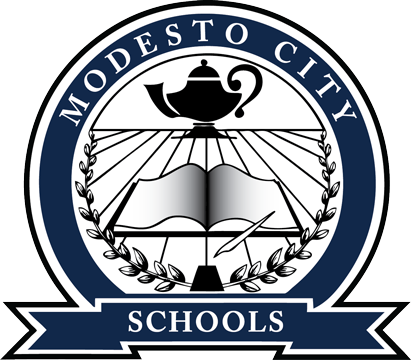Modesto City Schools is setting an example for sustainability and student engagement through its innovative programs and partnerships. One of those is the Climate Action Pathways for Schools (CAPS) program, which provides high school students with opportunities to lead the charge toward a greener future.
MCS’s Commitment to Sustainability
MCS has solidified its reputation as a sustainability leader, a vision reinforced by Gilbert Blue Feather Rosas, Director of Sustainability and Adaptation. Under his leadership, the district has implemented transformative initiatives, including:
Transitioning nearly half of its 62 diesel buses to battery-electric buses.
Installing six Sustainable Outdoor Learning Environments (SOLES) across district schools.
Investing in solar carports at the high schools to offset 70-85% of the total site energy usage and at the transportation yard to offset 50% of the energy required for electric bus charging.
Equipping every school with air monitoring systems.
Establishing environmental clubs at schools to encourage student-led sustainability projects.
In partnership with Cenergistic, an energy-efficiency firm, Modesto City Schools has also saved more than $3.8 million in energy costs between July 2020 and September 2024 by leveraging energy-monitoring software and conducting in-person audits to identify and reduce utility waste.
What is CAPS?
Building on MCS’s sustainability foundation, the CAPS program is taking sustainability to the next level by directly involving students. CAPS offers paid internships for juniors and seniors, allowing them to work on real-world sustainability challenges. This 2024-2025 school year, 20 CAPS interns are analyzing energy usage at school sites and developing strategies to reduce electricity consumption, creating tangible benefits for their campuses.
“These hands-on experiences support MCS’s sustainability goals and prepare students for future careers,” said Rosas. “CAPS participants learn practical skills in clean transportation, utility efficiency, and waste reduction, making them valuable contributors to the district’s broader environmental mission.”
Why It Matters
The CAPS program is more than a sustainability initiative; it’s a platform for shaping the next generation of leaders. Students are learning to tackle pressing environmental challenges while making measurable improvements and building a culture of environmental awareness across our schools.
One success story involves Salvador Reykjavik, who now attends UC Merced. This graduate of Enochs High School plans to share his current experiences with the CAPS students, reinforcing this program's peer teaching impact.
Laurence Olalde, a senior from Beyer High School and a member of the MCS Sustainability Committee, shares his experience:
“CAPS has introduced me to the skills I'll need as a future engineer,” said Olalde. “Thanks to CAPS, I've met amazing people who I look up to as my mentors. Sustainability is a problem my generation must solve, and I'm glad that I'm taking part in my community through CAPS.”
Looking Ahead
The CAPS program is poised for an exciting future with bold plans to:
Increase energy savings across Modesto City Schools.
Secure additional funding to expand internship opportunities for students.
Develop Career Technical Education pathways that align with sustainability and green job goals.
Broaden summer internship programs in partnership with district vendors.
"I hope the efforts of these students lead to significant energy savings for our district, increased funding for internships, the development of future Career Technical Education pathways, expanded summer internship opportunities with our vendors, and meaningful career opportunities down the road,” added Rosas.
At MCS, sustainability is not just a responsibility—it’s a way to equip students to actively participate in creating a better future. By involving students in hands-on projects, we empower them to become the change-makers of tomorrow.
Thanks to the support of MCS staff, CAPS students are helping drive the district’s sustainability efforts while building skills that will benefit them for years to come.
For more information about the CAPS program and its impact, visit the Sustainability and Student Engagement webpage.

